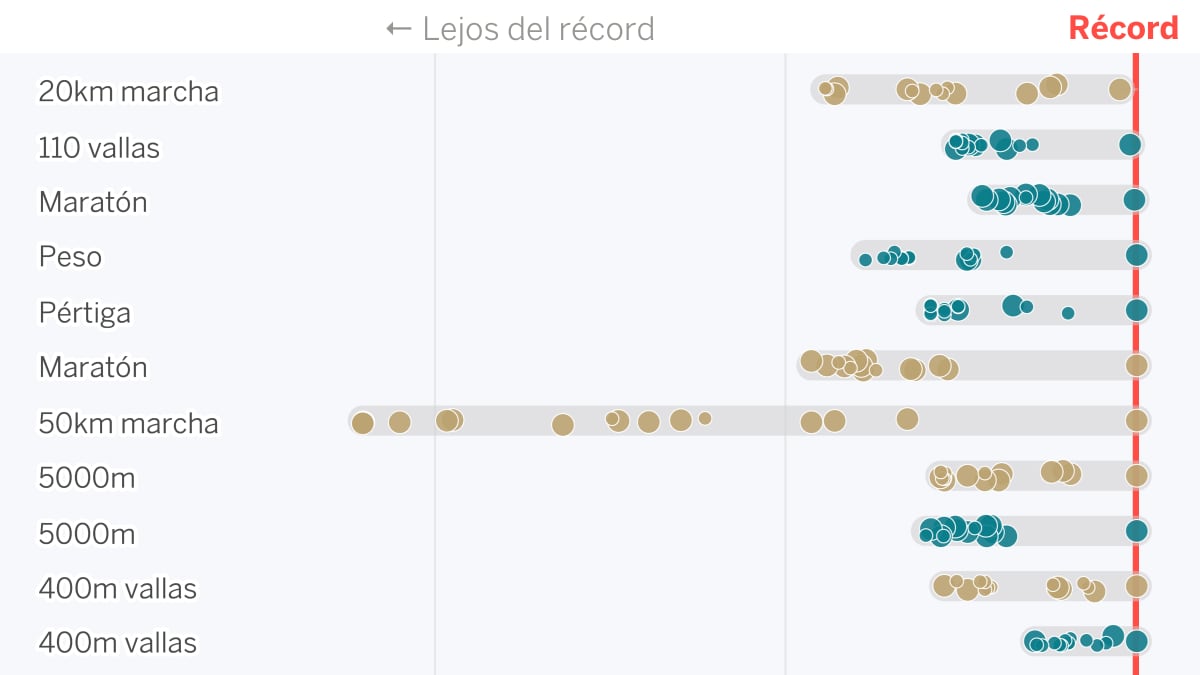Athletics kicks off this Friday in Tokyo, where they compete not only for medals, but also to enter history with a world record.
Achieving it at the Games is not easy, but it happens: in Rio four years ago three records were broken, and in London 2012 and Beijing 2008, four.
This week dozens of athletes will try again, but in which events are the records closest?
To answer that question, we have calculated the distance between the best recent brands - since 2019 - and current records.
Then we express that distance with a percentage to be able to compare.
This first graph shows the almost unbeatable tests:
There are eight records that were set decades ago, in the eighties or early nineties, on which doping suspicions are planned.
They are unattainable moment marks.
The best shot putters in Tokyo would have to shoot 10% further to break the 1987 record.
The next records on the list include sprinter Usain Bolt's two, also distant.
Later, more and more vulnerable ones enter:
Finally, we reach the most within reach records, starting with the women's triple jump, threatened by the Venezuelan Yulimar Rojas:
There are four records that have been achieved this year and up to 10 that are after 2019, including nine whose record holders will be in Tokyo.
Then you have to add five disciplines where you compete with brands at 99.5% of the record: the 1,500 female (from 2015), the 20 and 50 kilometer walk for men (2014 and 2015), the 110 hurdles for men (2012) and the female triple jump (1995).
It is clear that in Tokyo there will be athletes capable of setting stratospheric records, but that is not enough, because at the Games there are not always the circumstances or the incentives for the records to fall.
On the one hand, you have to take into account the atmospheric conditions, which are a lottery, or even lower the records in summer (in events such as the marathon, it seems that the optimal thing is that it is colder). Strategies also change. In some Games, athletes also want medals, which can make them more conservative: you will only give 100% if your rivals demand it. In long distance, many records are achieved in one-day events, where the brand is searched and even hares are used - companions who are responsible for maintaining the ideal rhythm, or even a lighting system for the same purpose - and where sometimes there are succulent economic prizes. That is why the Olympic records are not always the best, although there are exceptions such as Rio 2016, when the Ethiopian Almaz Ayana broke the world record of 10,000.
This year, in addition, there is another reason to expect more records: the technology of a new shoe.
A novelty in Tokyo is that it will compete with a revolutionary shoe, first developed by Nike and that offers runners a not inconsiderable performance bonus.
According to a study, shoes like the Zoom Vaporfly allow you to run 4% or 5% faster, which is enough to turn a good mark into a record, as the previous graphs showed.
The secret is a carbon plate on the sole and thick soles, which return more energy to the runner with each impact with the ground, stride by stride.
With these shoes, several records have already been achieved, as happened in Valencia last fall, in an event that was actually called
World Record Day.
, when Letesenbet Gidey set the best time in history at 5,000 and Joshua Cheptegei at 10,000.
The two athletes wore Nike ZoomX Dragonfly.
Finals schedule and possible records
Below we review the test finals that take place every day and show how close the brands of the last three years have come to the world record.
Friday, July 30
The first Olympic final in athletics will be the men's 10,000 meters, one of the events with a recent record.
Ugandan Joshua Cheptegei achieved the best record in history last fall in Valencia and is the favorite to win in Tokyo, ahead of his compatriot Jacob Kiplimo, who two months ago achieved the second best mark in recent years.
Saturday, July 31
It seems difficult to see a record on Saturday.
The women's 100 meters and the men's discus are disputed, two events that have had their best records frozen for 30 years.
In the women's 100 meters, the record has been held by Florence Griffith since 1988, when she stopped the clock at 10.49 seconds.
It is one of the official but controversial records of the eighties, overshadowed by suspicions of doping.
In this cycle the Jamaican Shelly Fraser-Pryce has run at 10.63, closer than ever, although still at 14 hundredths.
Sunday, August 1
Yulimar Rojas threatens the triple jump record, which has been established since 1995, when Inessa Kravets went up to 15.50 meters.
A month ago, in Andújar, the Venezuelan Rojas stayed three inches away.
In the men's 100 meters, it seems difficult to improve the mark that Bolt set in 2009. In this cycle the best marks have been around 9.8 seconds, 2 tenths of their time.
The best mark since 2019 is held by Christian Coleman with 9.76, who will not be due to sanction - he skipped three anti-doping tests - followed by Trayvon Bromell, who achieved a 9.77 a couple of months ago, who is in Tokyo and is the apparent favorite.
Monday, August 2
Another vulnerable long-distance record is the women's 5,000 meters, which the Ethiopian Letesenbet Gidey achieved last year, after 12 years without moving.
It was the same day that Joshua Cheptegei achieved the 10,000 record, and he wore the same shoes.
A month ago, the Ethiopian Gudar Tsegay was only 7 seconds away from beating it again.
There are a dozen women who run just 2% slower than the record.
In 100 meters hurdles it seems somewhat more difficult to improve the times.
The current record holder, Kendra Harrison, has the record since 2016, which she achieved before the Rio Games, for which, paradoxically, she had not qualified.
Now she will be in Tokyo, although she is only half the favorite, because the Puerto Rican Jasemine Camacho-Quinn in 2021 has been faster.
Tuesday, August 3
Two records may fall on Tuesday.
Armand Duplantis, the pole vault favorite, can surpass his own record of 6.15 meters, with which he ousted the legendary Sergei Bubka last year.
In addition to the world record, Duplantis has the three best brands in recent years.
There are also record options in the men's 400m hurdles, after Norwegian Karsten Warholm smashed just a month ago Kevin Young's world record from Barcelona 92.
Wednesday, August 4
The 400-meter hurdles event promises to be one of the most exciting of these Games: the last two world record holders will compete.
The American Dalilah Muhammad broke all the previous records at the end of 2019 - the best time reached before was in force since 2003 - but a month ago it was beaten again by her compatriot Sydney McLaughlin, just 21 years old.
Thursday, August 5
One of the tests on Thursday is the men's shot put, where American Ryan Crouser can try to break his own record.
He set it earlier this year, with a throw that improved by 25 centimeters from the previous record, which had been in effect since 1990. Crouser is the favorite for the medals, has the six best recent records and has thrown almost half a meter further.
The 110-meter hurdles are also being held, with the participation of Grant Holloway, who in June fell one thousandth from breaking Aries Merritt's world record.
Friday, August 6
Many finals are disputed on Friday, although the most threatened records seem to be the 20-kilometer march, in women, and the 5,000 meters for men, where the record holder Joshua Cheptege will be, but also the 20-year-old Norwegian Jakob Ingebrigtsen, with a European record and the best mark of 2021.
Saturday, August 7
Half a dozen finals are played on Saturday. In the 1,500 there are many runners with good marks, although it seems that it is too far from the record that El Guerrouj achieved in 1998. In the javelin graph stands out the dominance of Johannes Vetter, who has the nine best records in recent years and that in 2020 it came pretty close to another long-lived record, Jan Zelezny's 98.48 from 1996.
But the most attractive test on Saturday will be the 10,000 women, where there will be a duel between two record holders who broke the record in June with just 24 hours apart.
First came the Dutch Sifan Hassan (29: 06.82), who improved the time that Almaz Ayana had set in the Rio 2016 Olympic final (29: 17.45).
But Hassan's record only lasted a few hours: the next day his mark was again lowered by the Ethiopian Letesenbet Gidey, who, on the same track and wearing the same shoes, stopped the clock at 29: 01.03.
The two will be in Tokyo to fight for the medals and who knows if for the record.
Sunday, August 8
On the last day of the Games, the marathon will be held, where Eliud Kipchoge will be, who has the best record in history since 2018, with 2h 01m 39s.
The Kenyan athlete is also the first to lose two hours in a marathon (1h 59m 40s), although that last mark is not official nor is it considered a world record for all the external aid he received during the race.
Methodology
. In the graphs we have represented the distance between each world record and the 15 best brands since 2019 (considering only electronic brands). We have expressed that distance as a percentage to be able to compare between different tests. For example, in jumping events that percentage simply represents the ratio of a mark from last year to the world record. If the record were 2 meters, a mark of 1.9 meters corresponds to a percentage of distance from the record of 95%. In the race tests we have calculated this percentage taking inverse values. It is useful to think in speeds to understand it. If the 100-meter record was achieved by running at 10.5 m / s, a 100-meter mark run at 5.25 m / s corresponds to a 50% distance percentage of the record — because you have run half fast.Making the calculations in this way, all the percentages are expressed between 0% and 100%. All data comes from the website of the
International Athletics Federation
.
Subscribe here
to our special newsletter about the Tokyo Games








/cloudfront-eu-central-1.images.arcpublishing.com/prisa/D67ESGDWRQDANN4TDVQRIHFWZM.jpg)



/cloudfront-eu-central-1.images.arcpublishing.com/prisa/N2FONJNZF353LTCY6JX5VZMUWU.jpg)

